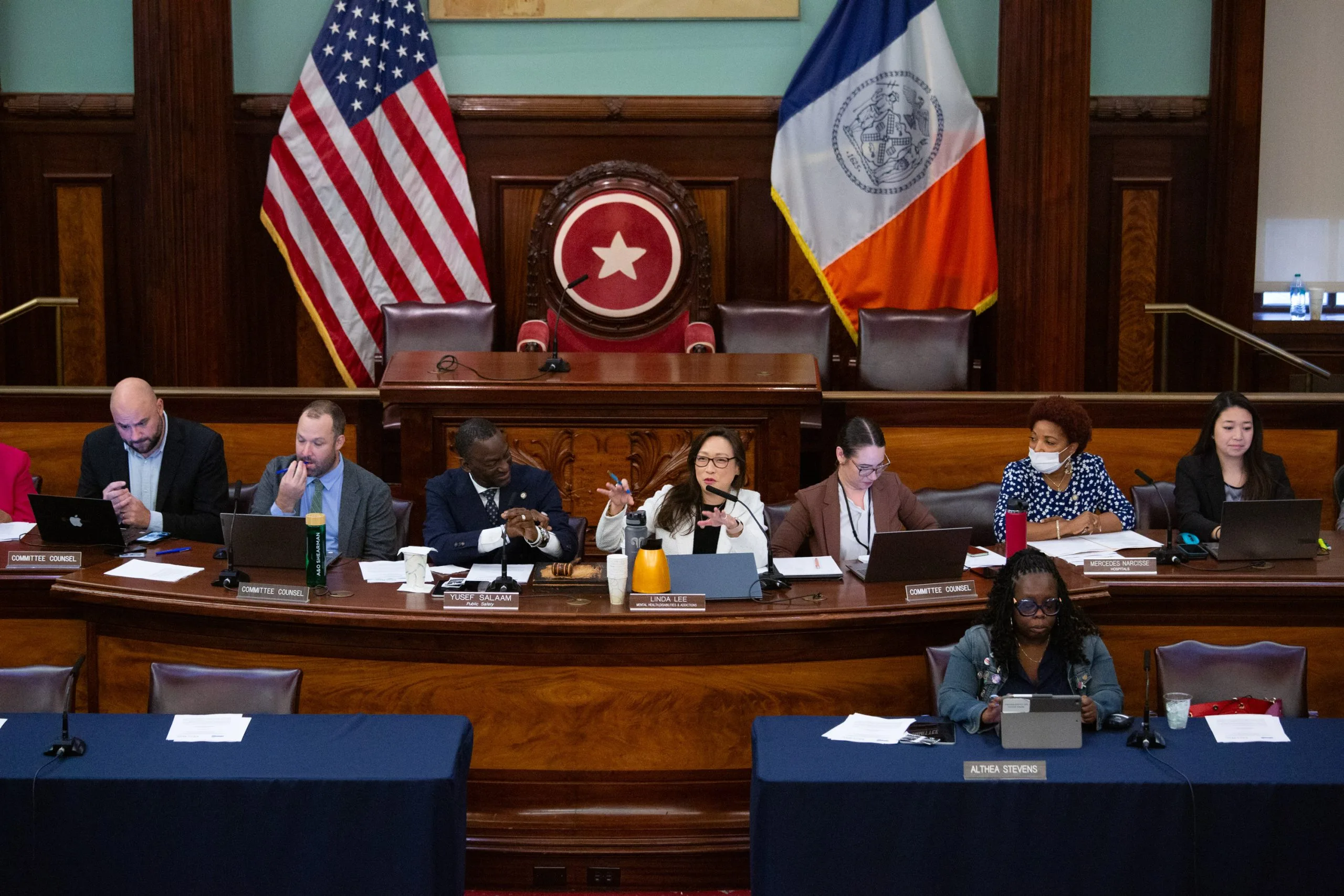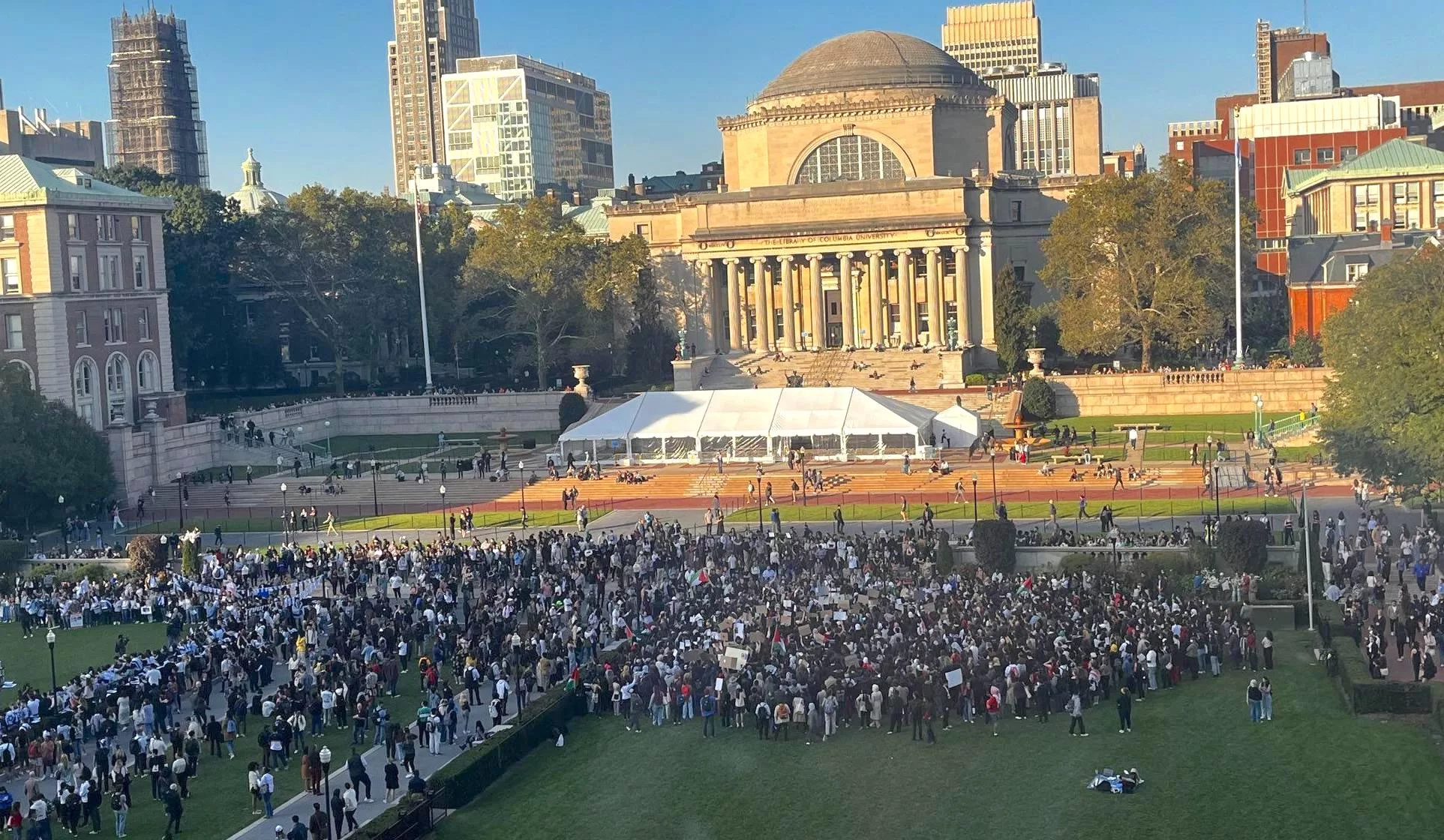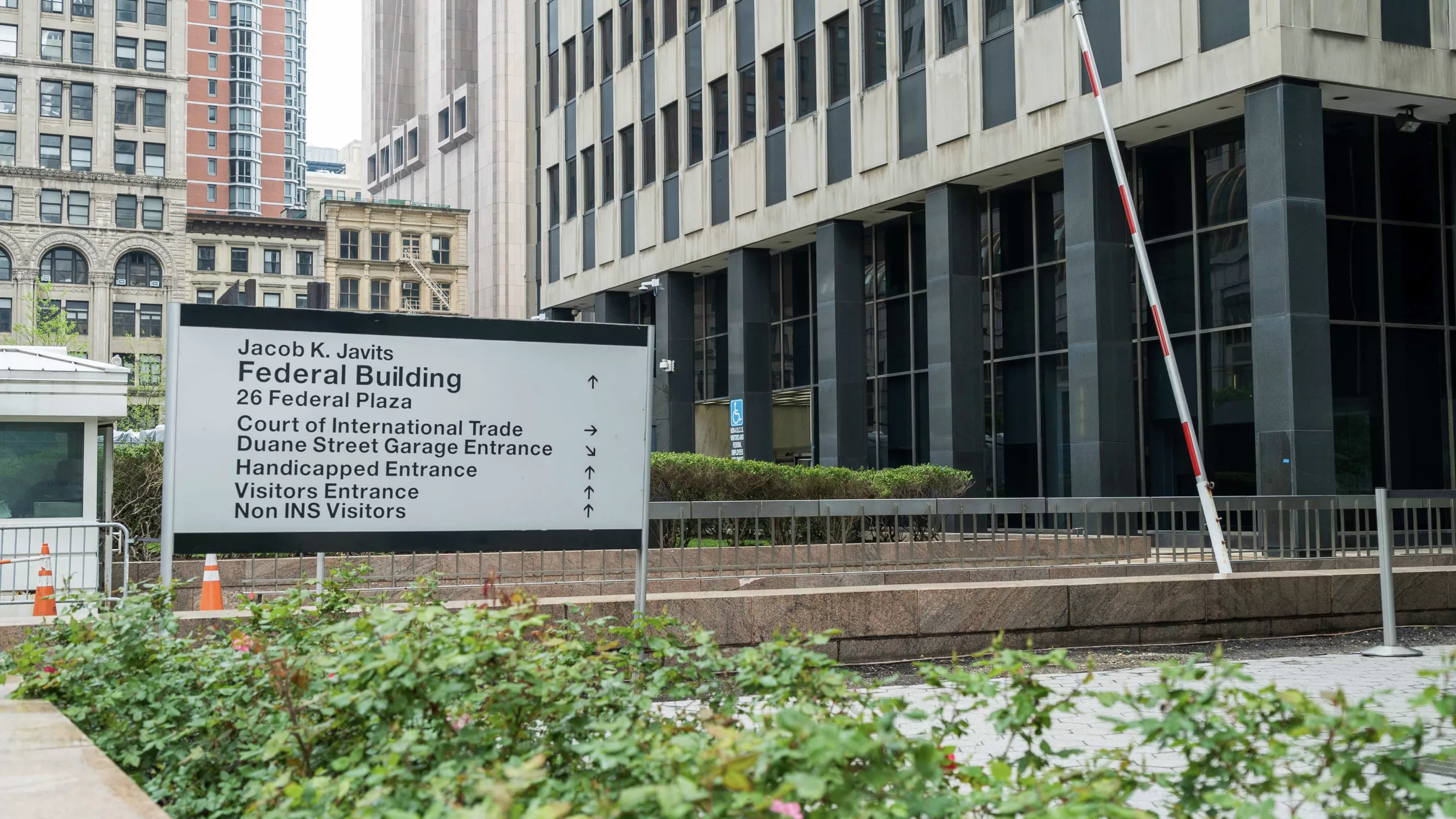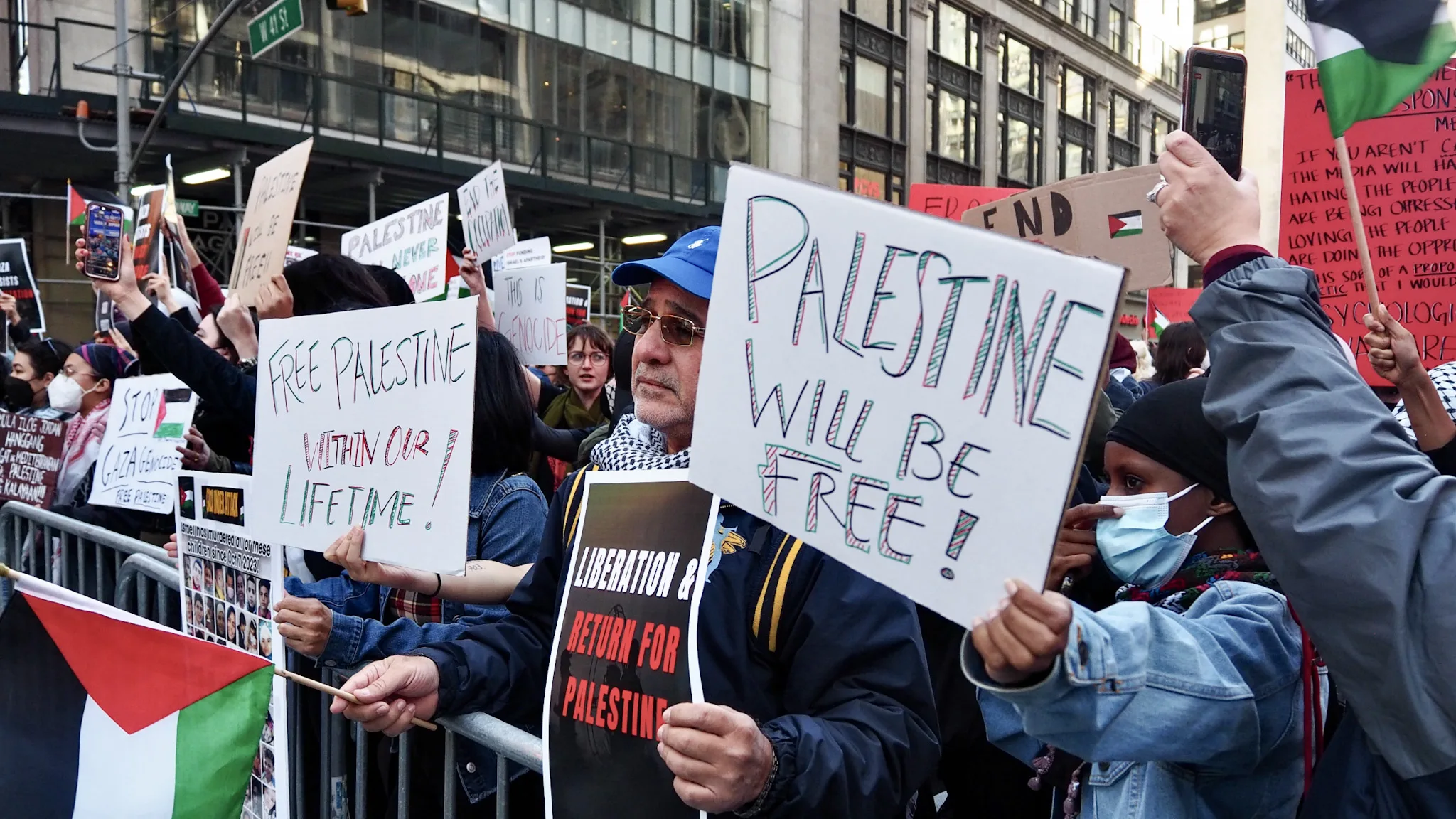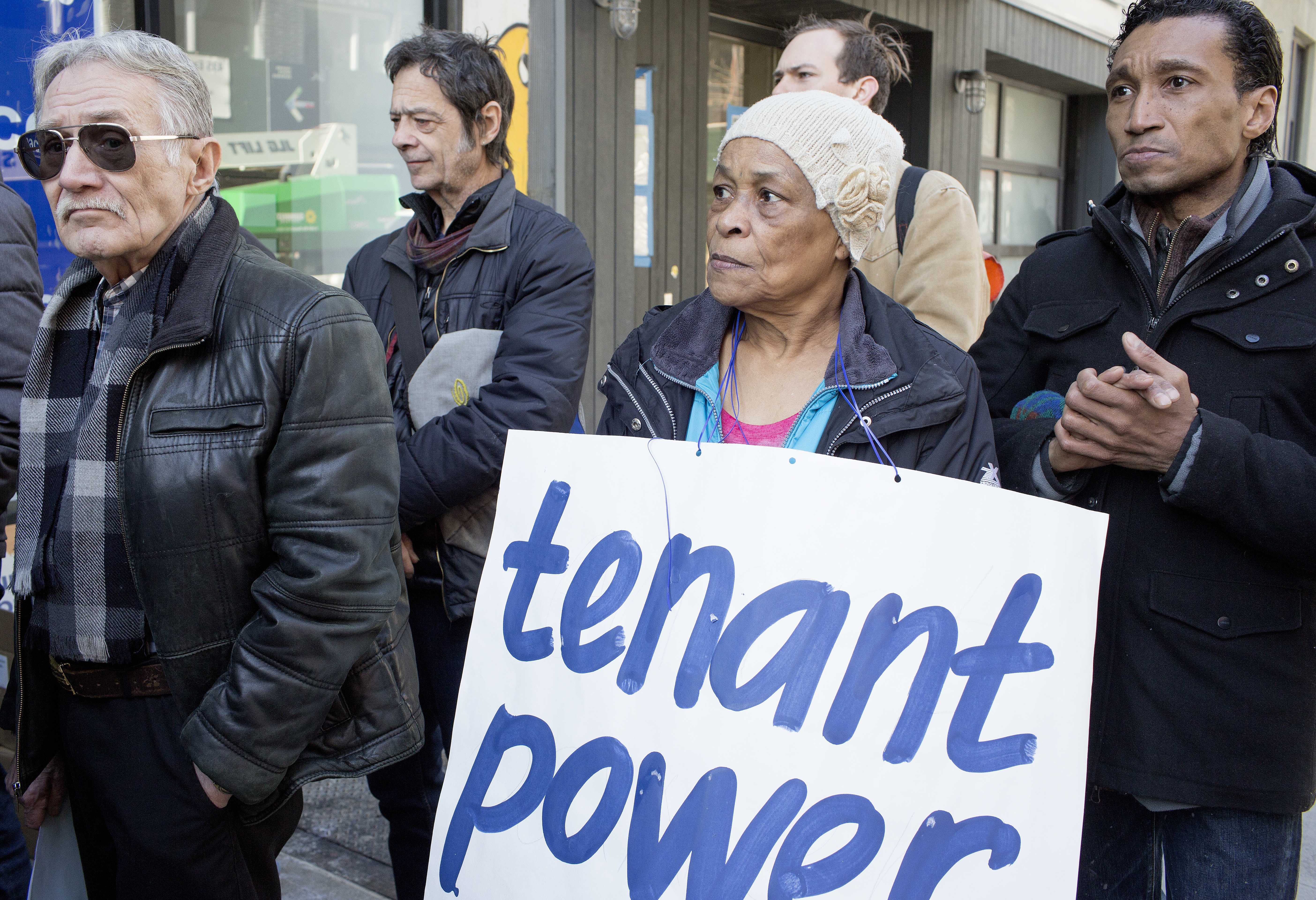It’s happened to all of us: You walk into the voting booth sure of your decisions, only to be overwhelmed when you flip the ballot over and see a bunch of questions you’ve never thought about before.
THE CITY is here to help take some of the pressure off.
Election Day is Nov. 5, and early voting starts Oct. 26.
That’s when voters in New York City will have the opportunity to decide on six ballot measures: one that would amend New York’s state constitution and five others that would make changes to the New York City Charter.
Jump to:
- What are ballot measures?
- Proposition 1: Equal Protection of Law Amendment
- Propositions 2 to 6: Where did they come from?
- Propositions 2 to 6: What do they say?
- Ballot Question 2: Cleaning public property
- Ballot Question 3: Additional estimates of the cost of proposed laws and updates to budget deadlines
- Ballot Question 4: More notice and time before votes on public safety legislation
- Ballot Question 5: Capital planning
- Ballot Question 6: Minority and Women-Owned Business Enterprises (MWBEs), film permits, and archive review boards
What are ballot measures?
Ballot measures are laws or questions that voters have the opportunity to weigh in on directly, as opposed to voting for representatives who then decide for us.
Many new policies have passed through ballot measures in New York, including the Environmental Bond Act in 2022 and ranked-choice voting in 2019. Voters have rejected others, including a proposal in 2021 to expand voting access.
This November, every voter throughout the state will see at least one question, Proposal 1, which would amend the state constitution. Depending on where you live, you may also see additional county or municipality-specific measures. Here in New York City, voters will decide on five other proposals.
Proposition 1: Equal Protection of Law Amendment
Question 1, as it will appear on your ballot:
“This proposal would protect against unequal treatment based on ethnicity, national origin, age, disability, and sex, including sexual orientation, gender identity and pregnancy. It also protects against unequal treatment based on reproductive healthcare and autonomy.
A “YES” vote puts these protections in the New York State Constitution.
A “NO” vote leaves these protections out of the State Constitution.
While New York has broad legal protections for abortion, supporters of Proposal 1— commonly known as the New York Equal Rights Amendment — say that enshrining those in the state constitution would make it harder to restrict abortion rights if the political situation were to change.
According to Sarah Steiner, a New York-based election attorney who supports the proposal, if there were to be a federal abortion ban, this amendment would provide a stronger protection for New Yorkers’ right to the procedure than a mere law would.
“If it is a New York constitutional amendment, it’s more likely that our rights here would be preserved,” Steiner said. “It’s the best chance we’ve got.”
New York’s state Republican Party opposes the proposal, saying that New York already has anti-discrimination laws and that this amendment goes well beyond creating a constitutional right to abortion in the list of protected classes it creates.
“This amendment is a Trojan Horse that would grant illegal immigrants access to benefits paid for by taxpayers, as well as open the door to non-citizen voting,” said NY GOP Chair Ed Cox in a statement in July. “It would also grant boys and men the right to compete in girls and women’s sports, by elevating ‘gender identity’ to a constitutional right.”
Cox also claimed the proposal “would give minors the right to puberty blockers and transgender surgeries without parental consent.”
Another opponent, The Coalition to Protect Kids NY, narrows in on the alleged threat to minors, as well: On its website, it calls the proposition the “Parent Replacement Act.”
Andrew Taverrite, a spokesperson for New Yorkers for Equal Rights, said that claims like this were false and “just not credible.”
“In New York, parental consent is already required for minors to receive any medical procedure related to gender-affirming care, and this amendment does not change that,” Taverrite said. “It will NOT allow young people to have surgeries without their parents’ consent.”
“This is a narrative being pushed by politicians using a small handful of innocent kids as political pawns,” he added.
Propositions 2 to 6: Where did they come from?
There are five other ballot questions — proposals two through six — that would amend the New York City Charter, the city’s governing document. The proposals would make a variety of changes, from adding barriers to city processes for budget approval and public safety legislation to expanding the purview of the Department of Sanitation. (More on the specifics in the next section.)
The path to getting these Charter-related propositions on the ballot has been rocky. In the spring, the City Council put forth a ballot measure to expand the “advice and consent” process that gives the Council the power to approve some mayoral appointees.
Around the same time, Mayor Eric Adams created his own Charter Review Commission, assembling some of his closest allies to lead the process, as THE CITY has reported. His commission met for two months this summer, a timeline that has been criticized by City Council and advocacy groups as rushed.
The dueling ballot proposals caused a legal clash. According to city law, the City Council’s ballot proposals and the mayor’s can’t coexist on the same ballot, and the mayor’s takes precedence. That means only Mayor Adams’ proposed Charter revisions will appear this November.
“Mayor Adams’ Charter Revision Commission Ballot Proposals 2-6 are no longer about bumping advice and consent, but could make government less responsive to New Yorkers,” Council spokesperson Julia Agos said in a statement, adding that the process was rushed.
“The Mayor’s Commission bypassed the extensive deliberation and public input of the legislative process that is 271 days on average to advance proposals only 2 days after their public release,” she said.
The executive director of the mayor’s commission, Diane Savino, says that its five ballot measures were the result of listening to New Yorkers’ needs.
“After holding hearings attended by more than 750 people in all five boroughs and receiving more than 2,300 written submissions, the Charter Revision Commission put forth thoughtful ballot proposals reflecting the desires they heard from New Yorkers for clean streets, fiscal responsibility, public safety, transparency in the city’s capital planning process and support for Minority- and Women-Owned Business Enterprises,” Savino said in a statement.
Opponents to the mayor’s charter revisions disagree and say that though these ballot questions seem innocuous, they are actually an attempt to interfere in the city’s legislative process.
“[Propositions] two through six weaken checks and balances and weaken local democracy and increase power for the mayor at a time when people all over the country should be voting for democracy up and down the ballot,” said Joo-Hyun Kang, a representative for No Power Grab NYC, a campaign that was formed in response to the proposed Charter revisions.
“It’s a sophisticated and sneaky move by the mayor,” Kang said.
According to Dwyer, New Yorkers can check their mailboxes for an NYC Votes Voter Guide from the NYC Campaign Finance Board that was just mailed out this week.
Propositions 2 to 6: What do they say?
The propositions will be short and easy to read in accordance with a “plain language” law passed in Albany last year. However, the brevity of the ballot questions can oversimplify them a bit: for a deep dive on each question; you can read the ballot abstracts, and for an even deeper dive, the Commission’s final report explains in detail how the ballot proposals came to be.
Luckily, we’ve read those documents for you. Here’s what you need to know about propositions two through six:
Ballot Question 2: Cleaning public property
Question 2 as it will appear on your ballot: “This proposal would amend the City Charter to expand and clarify the Department of Sanitation’s power to clean streets and other City property and require disposal of waste in containers.”
Currently, the city Department of Sanitation (DSNY) controls cleanliness and waste management on New York’s streets and sidewalks. However, there are some areas that fall outside of DSNY’s jurisdiction, like highway medians and parks. This proposition would enable DSNY to clean any city-owned property and enforce any regulations related to city cleanliness.
A “yes” on Proposition 2 would also establish DSNY’s ability to specify what kind of trash receptacles people use, a crucial point in the Mayor’s containerization initiative.
Even though it’s not mentioned in the text that you’ll read on your ballot, there’s a third piece of Proposition 2: authority over street vendors. Voting “yes” on Prop 2 would give DSNY the ability to ticket street vendors on all city-owned property, including within parks, where the Parks Department and the NYPD already have enforcement power. The NYPD and Parks would maintain authority over these areas — if passed, the ballot measure would give DSNY enforcement power there as well, which could lead to increased ticketing of vendors.
As reported by THE CITY in June, summonses issued to street vendors in city parks have been climbing since 2020, and advocates say that this will only lead to more unfair targeting of a largely immigrant workforce.
“They’re trying to sneak in a change to vending policy by adding more enforcement at a time when vendors are already being issued thousand-dollar tickets by armed officers for selling dollar waters,” said Carina Kaufman-Gutierrez, deputy director of the nonprofit Street Vendor Project, to THE CITY in August. “And to not mention it in the ballot question? That’s manipulative and disrespectful.”
When approached for comment, both Parks and DSNY referred back to City Hall.
Ballot Question 3: Additional estimates of the cost of proposed laws and updates to budget deadlines
Question 3 as it will appear on your ballot: “This proposal would amend the City Charter to require fiscal analysis from the Council before hearings and votes on laws, authorize fiscal analysis from the Mayor, and update budget deadlines.”
Before the City Council can vote on any legislation, they must present a Fiscal Impact Statement alongside the bill that estimates how much the proposed law could cost. As it stands now, these statements are the responsibility of the City Council, and are created by consulting with city agencies and good government groups. Staffers create the document when the bill is mostly finalized, but before the members vote on it.
A “yes” vote on Proposition 3 would change parts of this process: it would mandate that the City Council submit a Fiscal Impact Statement earlier, so that public hearings on legislation could take the cost of the law into account, and would necessitate that all statements have a budget estimate not just from City Council, but from the Office of Management and Budget — part of the executive branch, i.e. the mayor.
According to the Charter Revision Commission’s final report, the group consulted many budget experts as they considered the change. Fiscal hawks argue that this proposal doesn’t go far enough to curb spending and “address the very real problems of de facto budgeting through legislation,” president Andrew Rein of the Citizens Budget Commission told THE CITY in August.
Opponents of Prop 3 say that requiring the executive branch to submit a budget estimate before a public hearing on a bill is held will just delay lawmaking processes that already take years.
Jason Otaño, general counsel for the City Council, testified at one of the Charter Revision Commission hearings that Prop 3 would give the mayor’s office a “de facto veto” of proposed legislation, as the office could just indefinitely withhold the information needed to create a Fiscal Impact Statement. According to the Commission’s final report which collected the testimony, Otaño said that the proposal would have a “chilling effect on the exchange of ideas.”
In addition to its more controversial first provision, Prop 3 would also institute some short extensions on city budget deadlines. First, it would extend the preliminary budget deadline from January 16 to February 1 on years when a new mayor has been elected, and then shift the deadline where the Independent Budget Office reports on expenditures from February 1 to February 15. In every year, it would also extend the deadline for the executive budget to be submitted from April 26 to May 1, and then the deadline for borough presidents to make their recommendations from May 6 to May 13.
Ballot Question 4: More notice and time before votes on public safety legislation
Question 4 as it will appear on your ballot: “This proposal would require additional public notice and time before the City Council votes on laws respecting the public safety operations of the Police, Correction, or Fire Departments.”
This one is pretty straightforward. If the City Council wants to vote on a law that has to do with public safety — specifically concerning the NYPD, the city Department of Correction or FDNY — they have to notify the public, the mayor and all of the affected agencies at least 30 days before the vote.
In those 30 days, the mayor and or the agencies could hold their own hearings to solicit public input. The Charter Review Commission argues that since public safety is of “central importance” to the city, it requires a different public input process than other legislation. Union and agency representatives from the police, correction and fire departments agree.
Citizens Union, a good government group, disagrees, testifying at one of the public hearings that “public safety legislation receives similar public input opportunities as other laws on other issues.”
City and State reported that opponents felt that the Adams administration was pushing this proposal in direct response to two specific laws passed by City Council earlier this year: one that requires the NYPD to report on lower-level encounters with residents and another which bans solitary confinement. Adams vetoed both those laws, and the City Council then overrode him.
Ballot Question 5: Capital planning
Question 5 as it will appear on your ballot: “This proposal would amend the City Charter to require more detail in the annual assessment of City facilities, mandate that facility needs inform capital planning, and update capital planning deadlines.”
The city releases a number of reports that take stock of its infrastructure: what needs fixing, what needs to be expanded, what’s going to be built. If this proposition passes, one major annual report — the Citywide Statement of Needs — would be expanded to include more information on maintenance needs, and another report — the Ten-Year Capital Strategy — would need to explicitly take the findings in the Statement of Needs into account for its plan.
According to the Charter Revision Commission, these recommendations were developed after testimony from Comptroller Brad Lander, who wanted to take advantage of the ballot measures to implement budget reforms.
However, Lander said that Proposition 5 does not actually draw on his office’s recommendations.
“[The proposal] is meaningless, does not advance transparency, and fails to improve the City’s capital planning process in any way,” Lander said in a statement. “Like the Commission’s rushed process and other recommendations, it is simply a cynical effort to distract New Yorkers.”
Unlike Lander’s proposal, which would involve a far larger infrastructure inventory, the Statement of Needs covers less than 1% of the city’s infrastructure. “Requiring the Citywide Statement of Needs to include additional detail on facility condition is meaningless for capital budget planning purposes – since these are in fact the projects that the City has already decided need to be improved and to invest funds to do so,” the statement read.
Ballot Question 6: Minority and Women-Owned Business Enterprises (MWBEs), film permits, and archive review boards
Question 6 as it will appear on your ballot: “This proposal would amend the City Charter to establish the Chief Business Diversity Officer (CBDO), authorize the Mayor to designate the office that issues film permits, and combine archive boards.”
The last question is actually three questions bundled into one. The first one would establish a permanent Chief Business Diversity Officer. The CBDO is a new position added by the Adams administration, and the current CBDO is Michael Garner. As the CBDO, Garner is heavily involved in the city’s Minority and Women-Owned Business Enterprises (MWBE) program, and has been part of the push to hire MWBE-shortlisted security firms for the city’s shelters — a list that includes a security firm previously owned by former Deputy Mayor Philip Banks III.
Second, Prop 6 seeks to change which offices have the ability to issue film permits. Currently, if you want to make a movie, you need to get a permit from the Department of Small Business Services. This proposition would make it so that the Mayor’s Office of Media and Entertainment would also have the power to issue those permits.
Third, this proposition would merge two “redundant” archive boards: the Archival Review Board and the Archives, Reference and Research Advisory Board. Pauline Toole, the Commissioner for the Department of Records and Information Services (DORIS), which manages both boards, says that the DORIS proposed the merge in order to increase efficiency. She testified that recently, the boards have been meeting together — because their jobs are so similar that there’s no need to have separate meetings.
This story was originally published by THE CITY. Sign up to get the latest New York City news delivered to you each morning.
